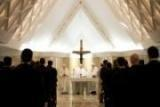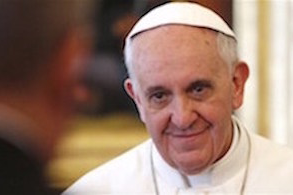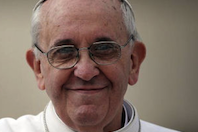Pope prays for martyrs who don't make the news

Pope Francis offered Mass on Monday morning in Casa Santa Marta, for "today's martyrs", persecuted and imprisoned Christians, and for Churches which are not free to express the faith. With the understanding that "a Church without martyrs is a Church without Jesus", the Pontiff stressed that these martyrs sustain the Church and carry her forward. Even when "the media doesn't speak about them, because it is not news", today "many Christians in the world today are blessed because they are persecuted, insulted, imprisoned just for carrying a cross or for confessing to Jesus Christ." Therefore, when we complain that "we don't have something", we should remember "these martyrs who today, in greater numbers than in the first centuries, suffer martyrdom."
The Pope was reflecting on the day's first reading (Hebrews 11:32-40). "Toward's the end", he said, "the author makes an appeal to memory: 'Call to mind your ancestors, call to mind the early days of your vocation, remember, call to mind the entire history of the Lord's people'". Remember everything in order "to strengthen our hope. Remember better in order to hope better; without memory there is no hope."
It is precisely "the memory of things which the Lord has done among us, that gives us our stamina to go forward, and also the foundation." Thus, at the "end of the letter to the Hebrews, in Chapter 11, which is what the liturgy proposes for these days, there is the memory of the docility of many people, beginning with our father Abraham, who departed from his land not knowing where he was going, docile: memory of docility."
"Then, today, there are two memories," the Pope noted, citing the day's reading. Above all, "the memory of the great acts of the Lord, done by men and women and, as the author of the letter says: 'For time would fail me to tell...'". At this point "he begins to name Gideon, Barak, Samson, Jephthah, David, many people who did great things in the history of Israel". This "is the memory, we can say, of our heroes of the people of God."
There are three groups: the first group "was those who were docile to the call of the Lord", the second "those who did great things," and "the third" recalled "the memory of those who suffered and gave their lives like Jesus."
The letter continues: "Others suffered mocking and scourging, and even chains and imprisonment. They were stoned, they were sawn in two, they were killed with the sword; they went about in skins of sheep and goats, destitute, afflicted, ill-treated - of whom the world was not worthy - wandering over deserts and mountains, and in dens and caves of the earth." In a word, this is the "memory of the martyrs." The Church is precisely "these people of God who are sinful but docile, who do great things and also give witness of Jesus Christ to the point of martyrdom."
"The martyrs", are those who carry the Church forward. They are those who support the Church, who have supported it and support it today. And today there are more martyrs than in the first centuries", even if "the media doesn't say so because it isn't news. Many Christians in the world today are blessed because they are persecuted, insulted, imprisoned."
Today, Francis stressed, "there are so many in prison just for carrying a cross or for confessing to Jesus Christ: this is the glory of the Church, it is our support, and also our humiliation, we who have so much, so much seems easy for us, and if we lack something we complain". However, "we think about these brothers and sisters who today, in greater numbers than in the first centuries, suffer martyrdom."
Recounting his visit to Albania in 2014, the Pope said he was unable to forget "the witness of that priest and nun in the cathedral of Tirana, who had experienced years and years of imprisonment, forced labour, humiliations, nonexistent human rights."
On 21 September 2014, during vespers at St Paul's Cathedral in Tirana, Sr Maria Kaleta and Fr Ernest Simoni delivered testimonies about the persecution which Christians endured under the regime. (Fr Simoni was later created cardinal during the 19 November consistory last year.)
It is right for us to be "satisfied when we see a great ecclesial act, which has had great success, and the Christians who manifest it," he said. This can be seen as a "strength." However, "the greatest strength of the Church today is in the little Churches, tiny, with few people, persecuted, with their bishops in prison. This is our glory today, and our strength today." This is because "a Church without martyrs, I dare say, is a Church without Jesus."
Pope Francis called us to pray "for our martyrs who suffer so much, for those who were and who are in prison, for those Churches which are not free to express themselves: they are our support, they are our hope". Already "in the first centuries of the Church one ancient writer said: 'The blood of Christians, the blood of the martyrs, is the seed of Christians'". These, "with their martyrdom, their witness, with their suffering, even giving their lives, offering their lives, disseminate Christians for the future and in other Churches". It was for this reason that the Pope wanted to offer the day's "Mass for our martyrs, for those who now suffer, for the Churches that suffer, who are not free," thanking "the Lord for their being present with the strength of his spirit, in these our brothers and sisters who today give witness to him."
Source: Vatican Radio


















